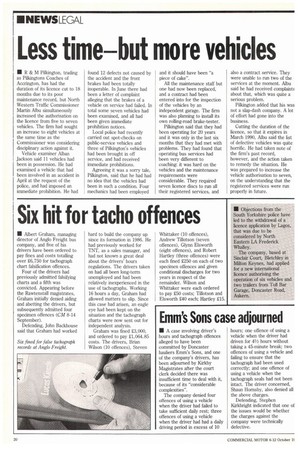Less time but more vehicles
Page 18

If you've noticed an error in this article please click here to report it so we can fix it.
• R & M Pilkington, trading as Pilkingtons Coaches of Accrington, has had the duration of its licence cut to 18 months due to its poor maintenance record, but North Western Traffic Commissioner Martin Albu simultaneously increased the authorisation on the licence from five to seven vehicles. The firm had sought an increase to eight vehicles at the same time as the Commissioner was considering disciplinary action against it.
Vehicle examiner Alban Jackson said 11 vehicles had been in possession. He had examined a vehicle that had been involved in an accident in April at the request of the police, and had imposed an immediate prohibition. He had found 12 defects not caused by the accident and the front brakes had been totally inoperable. In June there had been a letter of complaint alleging that the brakes of a vehicle on service had failed. In total some seven vehicles had been examined, and all had been given immediate prohibition notices.
Local police had recently carried out spot-checks on public-service vehicles and three of Pilkington's vehicles had been brought in off service, and had received immediate prohibitions.
Agreeing it was a sorry tale, Pilkington, said that he had had no idea that the vehicles had been in such a condition. Four mechanics had been employed and it should have been "a piece of cake".
All the maintenance staff but one had now been replaced, and a contract had been entered into for the inspection of the vehicles by an independent garage. The firm was also planning to install its own rolling-road brake-tester.
Pilkington said that they had been operating for 20 years and it was only in the last six months that they had met with problems. They had found that operating bus services had been very different to coaching it was hard on the vehicles and the maintenance requirements were considerable. They required seven licence discs to run all their registered services, and also a contract service. They were unable to run two of the services at the moment. Albu said he had received complaints about that, which was quite a serious problem.
Pilkington added that his was not a slap-dash company. A lot of effort had gone into the business.
Cutting the duration of the licence, so that it expires in March 1990, Albu said the list of defective vehicles was quite horrific. He had taken note of the firm's past record, however, and the action taken to remedy the situation. He was prepared to increase the vehicle authorisation to seven, on the understanding that the registered services were run properly in future.






















































